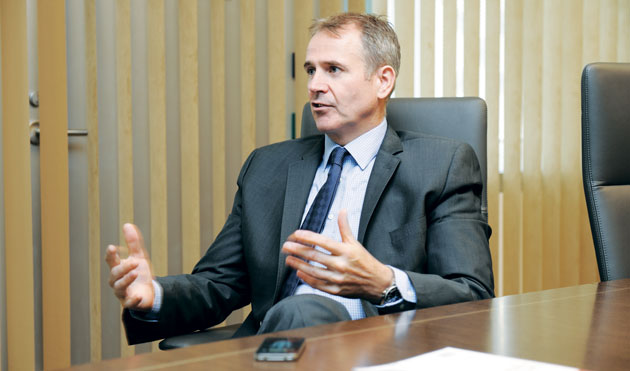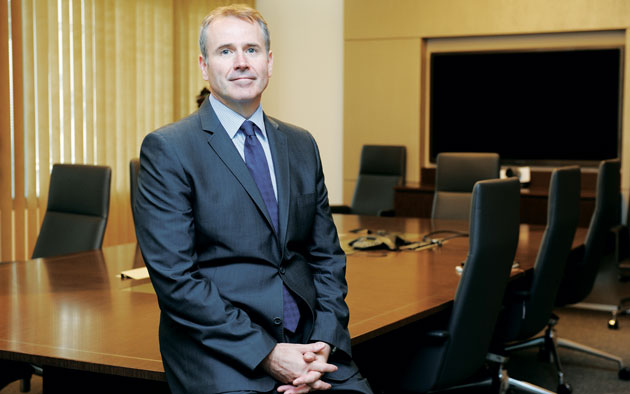Strength in diversity: An interview with the new CEO of Vodafone
In an exclusive interview, new Vodafone Qatar CEO Kyle Whitehill tells The Edge how his time spent working for the brand in Africa and India, as well as with joint ventures, has been ideal preparation for his current role. He reveals his insights into the telecommunications sector and how he plans to grow his firm’s Qatari market share and company stock value.
 Incoming Vodafone Qatar CEO Kyle Whitehill hopes to increase network coverage, raise the brand profile, add value and improve service standards, as well as increase market share for Vodafone among Qatari nationals and in the fixed line and enterprise market segments.
Incoming Vodafone Qatar CEO Kyle Whitehill hopes to increase network coverage, raise the brand profile, add value and improve service standards, as well as increase market share for Vodafone among Qatari nationals and in the fixed line and enterprise market segments.View the Infographic: Vodafone by the numbers
Upon meeting Kyle Whitehill, the new chief executive officer (CEO) of Vodafone Qatar, it is as clear as a strong mobile phone signal that he is fascinated with the dynamics of telecommunications in diverse emerging markets such as Qatar.
Whitehill’s career – which prior to his arrival in Doha in June of this year includes more than two years as chief operating officer of Vodafone in India, and three years as CEO of Vodafone in Ghana – also points to an affinity to working with a range of nationalities in warmer climates far removed from his native Scotland.
For Whitehill, this diversity begins with his own staff, which in Qatar encompasses 400 people of more than 40 nationalities. “Qatar and the United Arab Emirates (UAE) and Saudi Arabia are quite unique in this kind of multiple country population, from a culture point of view,” Whitehill tells The Edge with a broad smile, adding, “Vodafone’s big thing in people has been about diversity. I see culture, and I say I am living the dream here.”
This enthusiastic embracing of multiplicity within his own organisation, and in the wider Qatari telecommunications market, presents Whitehill with a challenge he relishes, but more importantly has the practical experience to take on.
40% - The target market share for Vodafone Qatar by 2018.
From a distance, Whitehill reasons, one can easily surmise Qatar, with the highest per capita income in the world, is comprised of an excessively wealthy population. But the reality, he says, is that the vast majority are here to perform a relatively unskilled job and their demands are very similar to those of prepaid customers in Africa or India. “They want good value and they want access to you to solve their problems,” he explains. “So I think there is a similarity; when you are serving a large customer base that has the same type of thinking and needs as Africa and India, it is really helpful.”
Whitehill’s origins and experience in the United Kingdom and Europe also place him well to understand the Qatar-based expatriate market segment that is, he says, “the complete contrast, which is the population that is very European and American in their thinking and want a completely different type of service.”

Capturing what he calls the “high value” portion of the Qatar market will be a challenge for Vodafone Qatar, one that Whitehill tells The Edge must be a one-to-one customer service model similar to high end fashion brands such as Burberry in the UK. “It has got to be personalised,” he says. (Image Corbis)
Moreover, working in diverse emerging markets, Whitehill adds, has placed him well to not only relate to the prepaid and expatriate markets, but to deal effectively with board members of different nationalities (in his case mostly Qatari establishments and individuals), and to recognise the complicated structure of joint ventures, where Vodafone Qatar might not necessarily be the only partner. “Understanding how that works was also important,” Whitehill continues, adding that Vodafone also aims to grow their share of the fixed line market, “and we want to become serious players with enterprise – business to business – and I have a lot of experience with that…those things were the key drivers.”
Market dynamics
During his first few months in Doha, Whitehill reveals, he has observed that international white-collar expatriates – predominantly North American or European – behave otherwise as consumers in Qatar than they might at home. “I find that very fascinating,” he says. “They make very different buying decisions.”
For example, such an expatriate might buy a telecoms product in a supermarket, consumer behaviour that has more akin with the migrant worker prepaid market. “I ask them why wouldn’t you go to an Ooredoo or Vodafone store?” Whitehill says, displaying for the first time his penchant for referring to his company in the first person, as if he and Vodafone Qatar were a single entity. “I want to understand that one better.”
Whitehill concedes that this might be due to a period when Vodafone Qatar was perhaps growing too fast and was the subject of some negative publicity regarding its services and offerings. “But that does not reflect the reality today,” he counters.
Indeed, communicating to these consumers that Vodafone Qatar’s products and service have evolved as considerably is one aim for Whitehill and Vodafone Qatar. However with 1.146 million customers in Qatar at last count in June 2013 – gaining 268,000 customers in comparison to the same period of last year and up 62,000 from April to June this year alone – their overall market share is ostensibly moving closer to 30 percent from its 2012 year-end figure of
28.5 percent (their target for 2018 is 40 percent).
It is also a goal of Vodafone Qatar to grow their share among consumers in what he terms the Northern Arab and particularly the Qatari population, which Whitehill refers to enthusiastically as “high value”, to 300,000. “I love that segment,” he says, “because [they are] hugely sophisticated in their thinking. The vast majority of Qataris have a very strong relationship with London and are completely familiar with the way that brands work [and] what they want from a level of service from a provider.”
The embracing of multiplicity in Qatar presents Whitehill with a challenge he relishes, but more importantly one he has the practical experience to take on.
These consumers, adds Whitehill are also familiar with the globally ubiquitous red Vodafone brand. However many of these multiple handset and SIM card owning individuals may use Vodafone whilst travelling, once back in Doha they revert to using the services of the firm’s only competitor, Ooredoo.
Whether this is due to force of habit or familiarity, or even affection in the national psyche towards the 40-year-old former ‘Q-company’ Qtel, Whitehill admits he is not sure. He also concedes that winning over the higher end of the local market is a far tougher proposition than prepaid African or Asian migrant workers or postpaid office-bound Asians, Northern Arabs or Europeans.
Few of these local “high value” prospects, Whitehill opines, will enter a Vodafone or competitor store, leaving only one alternative. “A very high percentage of those Qataris have never had any experience with me,” offers Whitehill, again blurring the line between the CEO and his firm as he talks. “The reality is I need to go to them, he says. “[What] we are trying to drive our insight around is, how am I going to get to you, when you are sitting in a big villa surrounded by people, and me giving you a meaningful discussion about why Vodafone would be an attractive partner for you?”
Rather than a passive retail method, “where you wait for customers to come to you” as Whitehill says, the answer he feels is an active one-to-one customer service model, which he compares that employed by high-end fashion brands such as Burberry in the UK. “It has got to be personalised. It has got to be,” Whitehill continues emphatically. “You build a relationship…and you build trust in that relationship over time.”

New Vodafone Qatar CEO Kyle Whitehill hopes that during his tenure the firm’s QE share price will exceed QAR10 . “My number one priority is delivering returns for my shareholders,” Whitehill tells The Edge.
However, on the business-to-business and enterprise segment, Whitehill is far more upbeat when it comes to Qatari enterprise. “I can go meet him in his office and have a completely different conversation, because he is a businessman with different needs,” he furthers. Indeed, Whitehill says that the response to Vodafone’s ever-increasing offerings in the business space have been welcomed by Qataris, grateful that another operator has forced down prices and improved scope and service in the local market.
Network, brand, value, service
Overall for Vodafone Qatar, the way to achieve the company’s aims for Whitehill comes down to four simple components: build a network and a brand, create value and focus on service. “There is no great mystery around telecoms,” Whitehill smiles, explaining that while Vodafone’s strong presence in the Indian and Egyptian markets creates high awareness in the South Asian and Northern Arab diaspora, they are still working on better understanding as to how these groups connect with the brand while in Qatar.
A larger challenge for Whitehill and Vodafone Qatar now is to dispel the perception of the firm as a foreign entity, as it is majority owned by Qataris, while building on the strength of the global brand but retaining local relevance and fitting into Qatari culture.
On the value proposition, referring again to the benefit of having a more competitive market and not one that is dominated by a public sector entity, Whitehill points out that prices have dropped sharply since Vodafone has come into the marketplace. Service, he reiterates, has also improved in general – and in Vodafone especially – since they came into Qatar. Indeed, furthers Whitehill, good service is the key thing to get right and to moreover innovate in its delivery, because ”that is going to make the difference to you ultimately.”
“Vodafone aims to become serious players in the fixed line marketplace and we want to become serious players with enterprise – business to business.”
As the incumbent former monopoly, Ooredoo presents for Vodafone Qatar a formidable competitor for the local market share, but also across the spectrum of telecoms products and services in which the two firms compete. Despite support from Qatar Foundation (QF), taking on the then Qtel was always going to be a challenge, Whitehill says, comparing their obstacles to those faced by pretenders to the dominance of the former UK state monopoly British Telecom (BT) when it privatised and that market opened up. Competing with the fixed line incumbent with access to millions of homes through copper and later fibre, explains Whitehill, offers such firms a massive competitive advantage.
“I have to work really hard to have any degree of competition. You know, we have the Pearl-Qatar, we have Barwa City where we are providing internet now, and that is terrific, but our competitor still has a huge advantage, so I am looking forward to having that unravel over time and we will have a more equal status.” Taking a lead from BT and other similar examples in Europe, the only way Whitehill believes that a balanced market place can be fostered by a regulator in Qatar creating a separate network entity and allow them “to fight it out for customers…which I think is what Qatar will ultimately do.
“I have no problem with that, if I can’t beat them on management, then I shouldn’t be here, right?” adds Whitehill, who says he respects his competitor highly and watches them closely.
When The Edge raises the possibility of a third telecoms operator coming into the Qatar market to challenge Vodafone and Ooredoo, Whitehill shakes his head. Citing India as an example, Whitehill explains how the market there once comprised of six operators – across 1.3 billion people, he is quick to add – and then grew to 14 companies before going back down to the current six.

In recent months Vodafone has opened new retail stores as well as a business service centre and increased its brand efforts in Qatar, earning the firm numerous accolades including a recent MENA Customer Delight award. (Image courtesy Vodafone)
Whitehill is adamant that even if a third operator was to emerge in Qatar it would struggle to survive, given that though Vodafone recently posted a quarterly distributable profits for the first time, the company is yet to make money. “In a population of more than say 20 million,” he says, “you might be able to sustain a third operator. But roughly you are going to have one or two operators who are going to able to make some money and a third who comes in as a challenger…falls away and then another that comes in and tries again. And I am talking in populations of 20 million or more.”
Profits and shares
After three-and-a-half years in the market, Vodafone Qatar itself is yet to achieve a full year of profitability. The firm recently posted its first positive quarter and has been achieving distributable profits for some months, and hopes to pay its first dividend to shareholders in the near future.
Since floating on the Qatar Exchange (QE) in July 2009, with an IPO (initial public offering) issue share price of QAR10.25, Vodafone Qatar’s share price briefly peaked that month at QAR11.4 but then sharply declined, bottoming out at QAR7.24 in March 2012, before recovering in May 2013 to QAR9.4 and staying closer to that value.
A potential decisive conundrum sometimes facing incoming CEOs in Whitehill’s position – pressure from stakeholders to deliver returns, but also to service and grow clientele in a demanding, diverse market – could be: which do you please first? Typically forthright, Whitehill says: “My absolute number one priority has got to be delivering a return for your shareholders, no debate about that…I would love to be north of QAR10, because then any shareholder who bought stock will be positive.”
Nevertheless, Whitehill explains that his mentor within Vodafone – none other than enigmatic group CEO Vittorio Colao – recently advised him not to obsess about share price. Markets are of course influenced by many factors, and though QE was recently awarded Emerging Market status by MSCI, Whitehill believes it will be some time before the positive effects will be felt, but adding when they do, “I am sure that will help everybody’s price.”
Vodafone’s presence in Qatar also positions it well for regional expansion, the international group potentially using Qatar as a small but strategic base to enter nearby markets. “All of my competition in the Middle East is expanding, Ooredoo are doing a fantastic job of expanding not just in the [region] but beyond the Middle East,” says Whitehill. “Zain are in six countries and you have got the UAE operators who all have ambition…QF have that ambition…so I think we have to have that ambition to expand.”
Vodafone Qatar’s ‘3D’ Strategy
Concerning Vodafone’s domestic strategy for Qatar, Whitehill calls this the ‘Three Ds: Deserts, Doha and Developments’. “We have to be physically present outside of Doha,” Whitehill elaborates on the first point, explaining that desert coverage is crucial in appealing to Qataris. “Whether there is one person or a thousand people there we have to be there,” he says.” You shouldn’t have to think about it.”

A challenge Whitehill hopes to have resolved soon for Vodafone Qatar is full network coverage across the country, especially in the desert areas, where both Qataris and expatriates spend a lot of time on the weekends and need to know their phones will work. “You shouldn’t have to think about it,” says Whitehill. (Image Corbis)
Then Doha, Whitehill explains, has not evolved to be highly compatible with traditional mobile networks. Mobile signal has to penetrate high, thick-walled office towers and underground, as well as handle busy shopping malls, also with thick walls. “The priority is giving you great coverage,” Whitehill repeats. “I don’t need you to be worrying about not getting a good signal.”
The third D, development, is an equally important focus for Vodafone Qatar because the country, and especially Doha, is growing so fast. There are, Whitehill offers, more developments in the city in 20 years here than in the borough of Manhattan in New York, which is of comparable size, in a century. “They had 100 years to get it right, and here it is all being done in less than 17 years from now.”
The vital thing Whitehill adds, is to try and correctly anticipate what technology might be available in the future and to be prepared for how that will affect coverage. Fortunately, Whitehill has technology on his side, including access to research and development data from the entire Vodafone Group, working on what fixed lines and mobility might look in the future and how to apply software solutions to optimise networks.
Nowhere perhaps is this more pressing than Qatar. As the interview winds down, Whitehill recounts how he had recently seen a 2004 photo of West Bay and was then shown an artist’s impression of how Qatar might look in 2030.
“Unbelievable,” he says. “And what I sat and thought was, I want to be a part of this, because I don’t think there are many jobs or countries in the world where people like you and I have got the opportunity to be part of this extraordinary change…this real sense of pride about the expectation in Qatar is really high and so I need to aim high for Vodafone here, that is what I need to do.”
Like this story? Share it.





